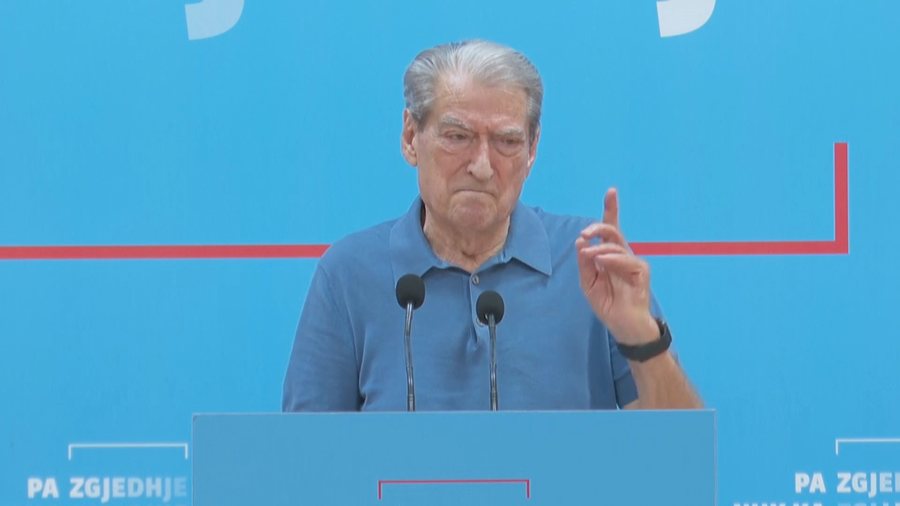
The leader of the Democratic Party, Sali Berisha, attacked the government for the new draft of the penal code, presented last week, saying that it "mercilessly hits citizens" and "treats officials with maximum leniency."
"From 1992 until today, Albania has drafted laws based on the best standards and assisted by competent European institutions. In 1995, the first penal code was adopted. In 2014, with the help of Euralius, the penal code that is in force today was drafted. And without turning 10 years old or fixed at 10 years, another new text of the penal code emerges from the mafia caves, without any consultation, from the offices of Edi Rama," Berisha said in a press conference, according to A2 CNN.
"Once again, the codes are supplemented with the criminal offenses that are created, with the practices that must be implemented, but changing the code every 10 years means that very sharp interests force you to take such an act. And when you undertake this in an almost secret manner, without any prior consultation with the main factors, with lawyers, with judges, with prosecutors, with civil society, with the media, with MPs, but you come out as if you took it out of the cave and presented it, it shows that you have nothing in common there with the interests of the rule of law, nor of the citizen, the protection of the lives and properties of citizens, but on the contrary you have the interests of the narco-state, the mafia state, the drug cartels that impose you to take such a step in complete secrecy."
Draft of a new Criminal Code, from conditional release of life-sentenced prisoners to minors aged 21
The Ministry of Justice presented last week a draft of an entire Criminal Code, which proposes, among other things, the possibility of conditional release of those sentenced to life imprisonment. The new legal document was drafted by a working group headed by the head of the School of Magistrates, Arben Rakipi, the same one who shared the novelties of the draft. “We have had several obstacles in the law related to the application of conditional release in relation to life imprisonment. People change, people improve, if the conditions in which they are placed and the work with them is effective,” said Rakipi.
The draft also provides for a change in the age limit for minors. "We will increase the age limit and we have foreseen that if certain other conditions set out in the law are met, a 21-year-old can also be treated as a minor."
The Minister of Justice made a public invitation to the parliamentary opposition to contribute to the new Code. "To the opposition of my country, to contribute with expertise and active participation in the public consultation tables. The new Criminal Code is a state and joint act of Albanians. Albania is going to the EU, not just a government or a certain political force," said Manja.
While the head of the Supreme Court said that he and the professional community were not yet familiar with the final version of the project, he shared the conviction of what the new Code should represent.
Criminal Code innovations, prison for fake Facebook profiles and wrong-way overtaking
Using a person's image to open a fake profile on social networks will be considered a crime in the new Criminal Code drafted by the Ministry of Justice. According to the draft, which is expected to be submitted to public consultation, when this fake profile on social networks causes the holder of the image to be harassed, persecuted or humiliated, the author is punished with a fine or imprisonment for up to three years, writes A2.
Other provisions related to the widespread use of technology, which are not in the current Code, are those of online stalking and harassment. The draft foresees from 2 to 6 years in prison for those who consistently engage in threatening behavior towards a person through information and communication technology, such as to make them fear for their safety, or who keep a person under surveillance through technology, without their consent.
In the same vein, in cases of online attacks on a person, causing psychological harm to a person, a penalty of a fine up to three years in prison is foreseen. Those who wrongfully initiate any electronic communication with the intention of intimidating, harassing or creating emotional distress to another person also risk a prison sentence of up to 4 years.
The same goes for sharing photos of himself or his relatives that make the person seem disgusting or degrading to the public.
Among the innovations of the new Criminal Code is the detailing of the range of serious violations of road traffic rules, categorizing them not only by the resulting consequence. Thus, penalties ranging from a fine to 3 years in prison are foreseen for drivers who make a wrongful overtaking, for those who exceed the speed limit, or who enter the road in violation, putting people's lives at risk or seriously risking accidents.
According to the draft, a criminal investigation for each of the violations will only begin in cases where an administrative measure has previously been taken against the perpetrator for the same type of violation. (A2 Televizion)











